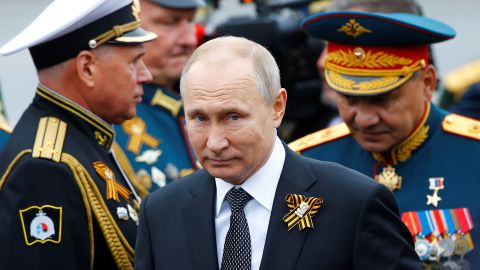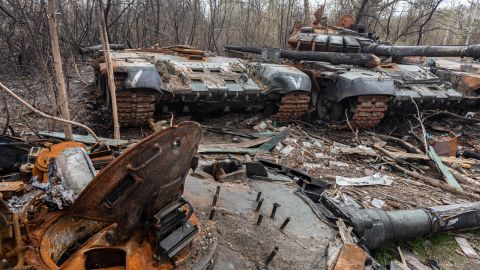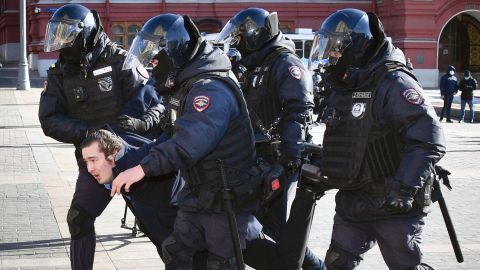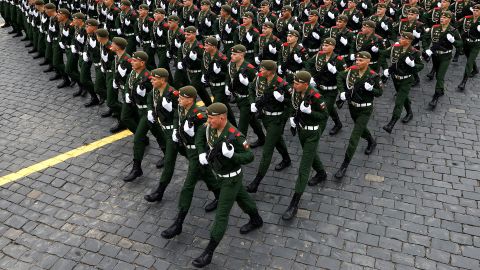President Vladimir Putin takes Russian anniversaries seriously. It was no coincidence that his invasion of Ukraine came a day after Defender of the Fatherland Day, a celebration of Russia’s military achievements. It was on that same occasion in 2014 that Putin took the first step in annexing Crimea from Ukraine, through orchestrated pro-Russian protests on the peninsula.
The leader had clearly hoped to have more to celebrate by this Victory Day on Monday, the country’s most patriotic of dates, marking the Soviet Union’s role in defeating Nazi Germany in World War II. It was on May 8, 1945, (May 9 in Moscow’s time zone) that Germany signed its Instrument of Surrender in Berlin, ending the fighting in Europe. The USSR suffered the biggest losses of any nation – around 27 million soldiers and civilians died.
Russia’s justification for war in Ukraine suggested a deadline for success by Victory Day. Putin and his government have repeatedly said the aim of their so-called “special operation” is to “denazify” Ukraine, and that freeing the country of Nazis is a matter of Russian survival. It’s an argument that has no real weight; a blatant cover for Russian revanchism.
Even though the Kremlin’s well-oiled propaganda machine has been going at full steam since the February invasion, it will be difficult for Putin to twist Russia’s losses into true victory on Monday.
If anything, the operation in Ukraine has been an embarrassment for him – at least on the international stage.

Russia’s military outsizes Ukraine’s by every measure – even with the heavy weapons the West is sending in – yet it failed to take territory in the north, let alone the capital, Kyiv, and is struggling to make gains even in the east, where it is now focused.
Ukraine’s armed forces claim that Russia has lost more than 24,000 troops in just over two months, and more than 1,000 tanks, over 2,600 armored vehicles and hundreds of aircraft. CNN cannot independently verify these numbers, and there are likely to be heavy losses on the Ukrainian side too. Still, it’s undeniable that Russia military is weakened.
Russia’s guided-missile cruiser the Moskva – once the crown jewel of its Black Sea fleet – is now a wreck, sitting destroyed in the depths of the sea.
Meanwhile, Putin’s foes in the West, whom Russia had tried so hard to divide over years, are increasingly united, all for the cause of ensuring victory for Ukraine.
Emily Ferris, a research fellow with the Royal United Services Institute, said that Russia’s failures had been largely logistical.
“Some of the logistical problems they had were partly because they never really managed to take major railway hubs at all, frankly, in the whole country,” Ferris told CNN. “And because the Russian motorized ground forces rely on the railways to move all of their troops, their hardware and their tanks. Because they never really managed to control those hubs, they never really managed to push particularly far into Ukrainian territory, and it meant that they then had to rely on off-road capabilities.”
Russian forces instead moved by trucks and slow-moving tanks, many of which were bogged down in mud, as warmer weather prevented the ground from freezing and allowing freer movement, Ferris said.
“Then it meant that it was tricky to tow the tanks back to Russia for repairs, because they were far away, and so a lot of them were abandoned. Lots of their equipment started breaking because the tanks can only take so much moving around,” she said. “And, of course, you have the very well-documented resistance from local Ukrainians, who didn’t take too well to being occupied.”

Even in the east, where Russian forces are trying to advance through the Donbas region, their gains have been limited. Pro-Russian rebels have been installed in the self-declared separatist regions of Donetsk and Luhansk for years, but still, Russia hasn’t annexed those areas, and its forces are struggling to get through a stiff Ukrainian resistance in big cities.
“We’re still talking about huge amounts of territory – Ukraine is massive – even if they are just focusing on the east and the south. Some of the claims from senior commanders that they’re going to be establishing a land corridor across the south of Ukraine, it’s still a huge task,” Ferris said. “The fact that they’ve not been able to take major cities and major rail hubs before is still a problem. I think that’s going to persist.”
An alternate universe
Sitting in Russia, however, it’s easy to think that the war is going to plan. Russian propaganda is flooding the media, which is almost entirely state-controlled, but in March the government also passed a law making “false news” about the military illegal, a crime that comes with a maximum 15-year jail term.
As a result, the antiwar protests that happened in Russia in the early weeks of the invasion have all but ended. And the media is largely complying with the new law.

Indeed, Russia is pushing ahead with force. It’s in the midst of a prolonged battle in the southeastern port city of Mariupol, where its forces are intensely shelling a huge steel plant that it has failed to seize. If the plant falls, the city is more or less in their hands.
Intelligence reports show that Russia could be planning to annex Luhansk and Donetsk “sometime in mid-May” and could also declare and annex a so-called “people’s republic” in the southeastern city of Kherson, according to US Ambassador to the Organization for Security and Cooperation in Europe Michael Carpenter, who spoke to reporters on Monday.
Any advancements are amplified in Russian media, where the messaging of success is very clear, Tatiana Stanovaya, founder of the political analysis firm R. Politik, told CNN.
“The message is that Russia is moving according to plan and everything is going as it should, that there are some gains. Russia has declared that it took Mariupol, and so everything is going according to the plan,” she said.
That messaging is filtering through to the Russian people effectively, according to Levada Center polls, which show that not only do the vast majority of Russians support the war, but 68% of Russians think the operation is proceeding successfully. Putin’s popularity has also soared to 82%, after remaining stubbornly in the 60s since the Covid-19 pandemic hit right up until February, the month of Russia’s invasion. Polling in Russia must be taken with a grain of salt, however, given people are subject to a stream of propaganda and dissent is not tolerated.
Stanovaya added that there was an additional narrative in state media that Russia is the victim in this war and that the country is acting defensively.
“When you’re watching Russian TV for several days, you can really start believing that we are in a huge danger of Ukrainian Nazis. That we are vulnerable, that we should, we must get up and protect ourselves, otherwise it’s a matter of Russian existence,” she said.
Putin doesn’t even need to use Monday to declare any kind of victory, Stanovaya argued. He will just need to bank on the anti-Nazi emotions of the holiday to consolidate his justification for war.
The world waits
As Russians will be listening in on Putin’s Victory Day speech, so too will global leaders and observers, eager to learn where Putin might take his war next. There has been much speculation, but as always with the Russian President, no one really knows.
There’s a growing sense of nervousness that with so little to show the world – if not Russians – more than two months into the war, Putin may double down on his “special operation.”
UK Defense Secretary Ben Wallace even suggested last week on a UK radio station that Putin may drop his guise of a “special operation” and outrightly declare war. Doing so could trigger a huge mobilization of Russian fighters, even civilian conscripts. Kremlin spokesperson Dmitry Peskov on Wednesday dismissed Wallace’s suggestion as “nonsense.” But if Russia’s military continues to deplete at the rate it is, it’s not impossible that Putin will make that decision at some point.

Andrei Kolesnikov, a senior fellow at the Carnegie Endowment for International Peace, said he thinks Putin’s original plan was to declare victory and an end to hostilities on Monday.
“But it is obvious that the war is dragging on, and Putin’s plan is not getting any clearer. But he must make some symbolic or practical gesture,” he said, speaking to CNN from Moscow.
“Everyone here is scared that he will announce a partial or full mobilization. Although such a measure might prove unpopular: the Russians have become militarists, but they are lazy militarists, sofa troops.”
While Victory Day is about World War II, it has also become a source of legitimacy for Putin, who has found ways to associate himself with the day, said Kolesnikov, who accuses the leader of simplifying the historical details and “turning the celebration into a pompous ritual.”
In the Putin years, the mythology around World War II has metamorphosized. Historians note it glorifies Soviet sacrifice, while downplaying Stalin’s willingness to squander human lives. It glosses over the darkest chapters of the war: The USSR’s pact with Nazi Germany that served as a prelude to war; the wholesale deportation of entire populations deemed untrustworthy by the Soviets; and mass rapes by Soviet soldiers in occupied Germany during the waning days of the war.
Even a grassroots parade known as the “Immortal Regiment” to honor those who died in the war has been co-opted by the government. Putin now routinely leads marches himself. Stalin – who refused to believe Adolf Hitler’s army would invade the Soviet Union when it did — is increasingly being celebrated as a hero on May 9, not as the leader who was caught off guard in the 1941 German attack.
“Of course, the new generations do not really understand the significance of the holiday,” Kolesnikov said. “Those who do understand and know history are horrified by the way Putin has privatized it.”
And on Monday, the significance of May 9 may change yet again, depending on what Putin has to say.
CNN’s Nathan Hodge, Masha Angelova and Mariya Knight contributed to this report.
Source: www.cnn.com
